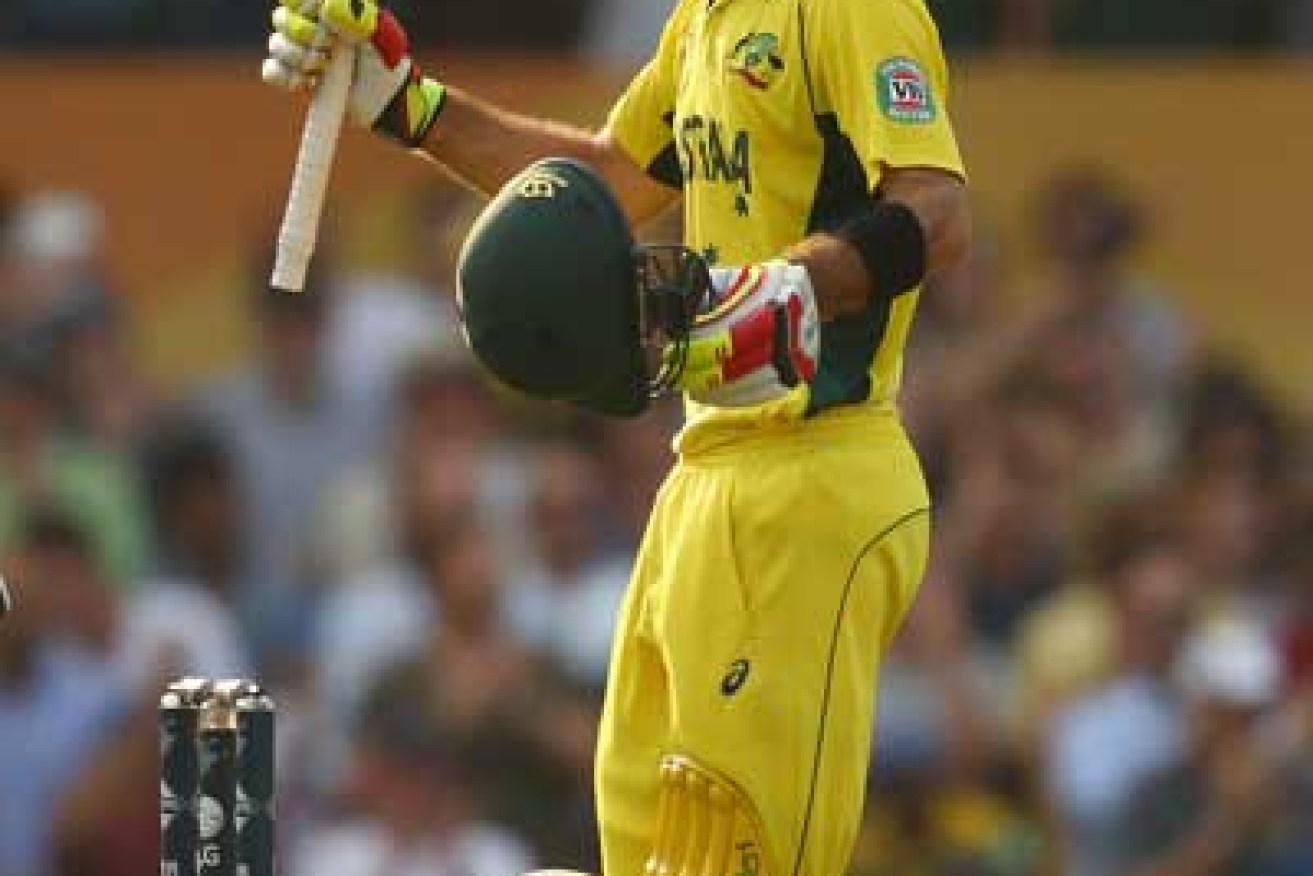Australians all let us rejoice … in English misery


Glenn Maxwell's ton helped Australia crush Afghanistan. Photo: Getty
Given the events of the past four weeks, you would be forgiven for thinking only those people with broad imaginations or long memories could see England at the top of the one-day international rankings.
But incredibly, it was just over two years ago that they occupied that spot – at the end of 2012. Today, that result seems as unlikely as the human race affording ‘Gangnam Style’ another billion YouTube views. Clearly, it was a strange time.
England’s decline in the 50-over format of the game has been a study in steady decay rather than spectacular explosion. This was no better illustrated than in their after-dark capitulation to Bangladesh on Monday that earned them premature BA16 boarding passes.
• Starc’s form is unnerving opponents: Bailey
• English cricket in limbo after World Cup disaster
In a pattern for this tournament, they displayed enough competence to be competitive, but not the adaptability to be true competitors.
England’s elimination also reinforced that post-colonial decades don’t diminish the perverse pleasure felt by the bulk of the cricket world when English teams fail; dominating a disproportionate amount of coverage compared to their actual title chances (yes, an irony not lost upon this column).
The good news is that with that particular sideshow coming to a close, attention returns to the top. In golf, the third round is known as ‘moving day’, where genuine contenders assert their authority to prepare for their final push. The closing days of this group stage have a similar feel, with remaining pool games as much an exercise in gaining fabled momentum as they are about group points.

Pakistan’s victory over South Africa was perhaps the upset of the tournament. Photo: Getty
Pakistan, the fly in the ointment
Objectively, we should not be having this conversation – a team who can lose to the West Indies just a couple of weeks ago surely can’t be a legitimate contender. But in creating the first major upset of the World Cup by knocking off South Africa in a thriller, effectively booking a quarter-final, Pakistan warrant a second look.
There will inevitably be comparisons between the 2015 squad and their 1992 compatriots, the latter winning the tournament after an equally disastrous start. They do share a couple of neat links to their predecessors.
Imran Khan famously issued the evocative order for his chargers to play like ‘cornered tigers’, attributed as a major psychological catalyst in their revival. While it is hard to imagine Misbah ul-Haq being quite so fulsome, his on-field performances in holding Pakistan’s middle order together embodies the spirit of an agitated big cat.
Imran had a left-arm quick by the name of Wasim Akram at his disposal, who defied early inconsistency of his own to be the defining bowler of the 1992 triumph. Misbah has not one but three southpaws hurling it down. Alone they aren’t fit to be in the same sentence as the great Wasim, but as a collective they were able to humble a South African team coming into the game with back-to-back scores of 400-plus.
If they draw Australia in a quarter-final, as looks likely, the confidence that sort of bowling performance will generate cannot be for nothing.
Old rules are redundant
In the space of 20 seconds on Sunday’s coverage of the Australia vs Sri Lanka game, there were half a dozen mentions of the rule-of-thumb that you double a score at 30 overs to calculate the final total. The numbers suggest that’s common wisdom in need of immediate revision.
Roughly half of the games in this World Cup (18) have seen a total set by the team batting first of 300 or more. In just three of those matches did the runs scored in the first 180 balls of the innings exceed those of the final 120. Indeed, the second, shorter stanza is responsible for an average of 35 more runs in this sample, and just four of those 18 totals have been successfully chased down.
These numbers reinforce the importance of not only the toss, but also the ability for teams to retain the services of the biggest weapons in their arsenal until these latter overs. Glenn Maxwell’s pair of force majeure frolics have commenced inside the last 20 overs, as did AB de Villiers’ 166 the previous week. It suggests that whether teams prosper or perish in the elimination stages of this tournament will be skewed to how they handle the last 90 minutes of this first innings.
The sidebar here is that we just haven’t seen this in Australia before. The past decade has seen a proliferation of scores 350 and above, sure – but not in our backyard. Until last month there’d only been two scores above that mark in Australian ODI history. The count is now at seven, with the top five all coming in this World Cup.

Glenn Maxwell’s ton helped Australia crush Afghanistan. Photo: Getty
Associates crash, leaders cruise
Associate member nations in this tournament have wanted their cricket to do the talking in support of their compelling case, rather than relying on their stories alone.
On that basis, it is only right that they don’t avoid the scrutiny of sub-par performance, which has been more common as we’ve gotten deeper into the tournament.
With the exception of Ireland, they didn’t have a good week. Afghanistan lost their nerve after a good start against Australia in being dealt the heftiest World Cup defeat ever issued, and then followed this up by falling to 6-59 against New Zealand, stopping that contest before it started.
Scotland threw away their second golden opportunity in as many weeks to lodge their first win on this stage, and the UAE would be disappointed not to have taken more from their back-to-back losses to India and Pakistan other than Shaiman Anwar’s consistency.
The time will come to evaluate the associate member contributions to this tournament, and by any credible barometer it has been a major one. However, it will do their case a dose of good if their last impression on this World Cup can be a very competitive one.
At the other end of the table, the only two teams to blitz the pool stage without defeat to date are also the quietest (with the exception of the Indian team’s ongoing spat with their travelling media, that is). It’s the ominous unobtrusiveness that comes with well-earned confidence.
What’s next?
By Sunday night the group game feast will have finally come to an end. For most, this will be welcome; for the die-hards who live for the daily cricket binge, it is probably tinged with sadness.
Some of the eight remaining fixtures are dead, while others are mainly of interest for mathematicians. For instance – what would Sri Lanka need to wallop Scotland by to pass Australia if their last fixture is rained out? Likewise, what would Chris Gayle (sorry, the West Indies) need to do to pass the net run rate of South Africa if they lose their way to the UAE? Academic, to say the least.
In reality, we’re left with one fixture of deep meaning, the 42nd and final, between Pakistan and Ireland at the Adelaide Oval.
Run rates as they are, Ireland will almost certainly require a victory to progress. On one hand, you could say that they’re getting Pakistan at the wrong time. On the other, since when has Pakistan’s form had any correlation from one game to the next? In any case, a grandstand finish in Group B seems just right.
Adam Collins was a senior adviser to the former federal government, and worked for the London 2012 Olympic and Paralympic Games organising committee. He tweets at @collinsadam








